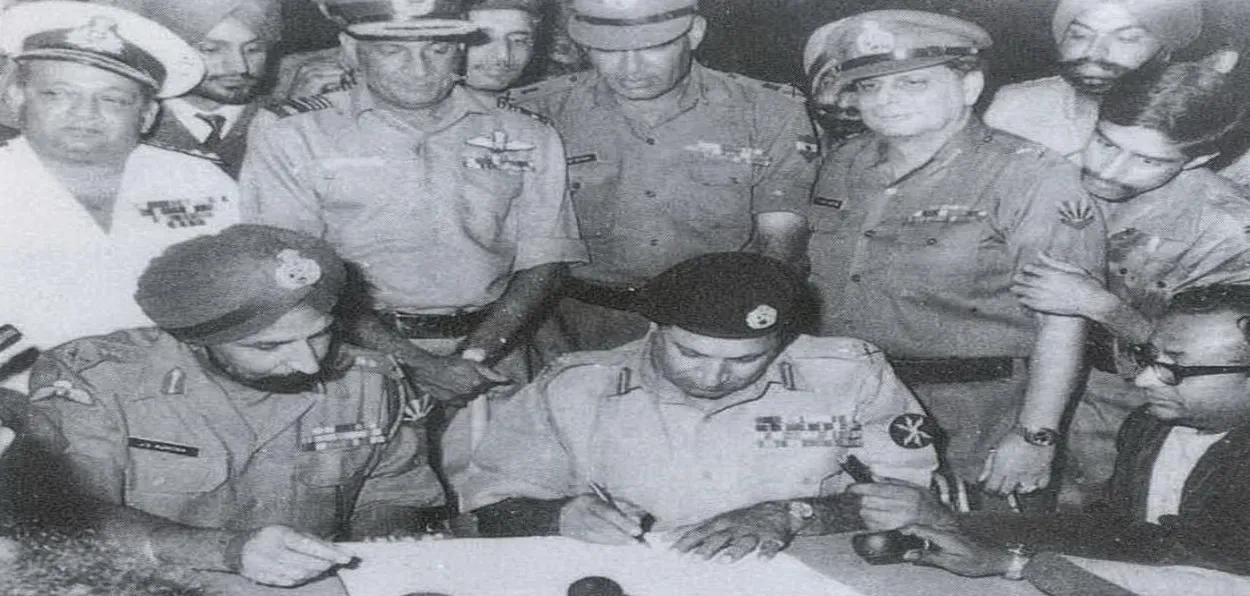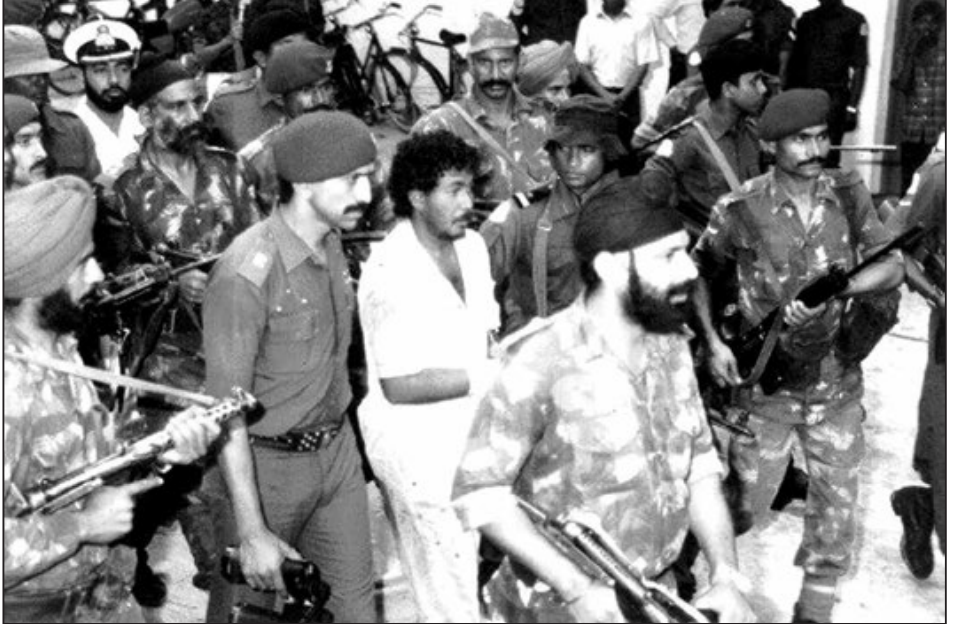
Saquib Salim
What does a democracy do when the democratic rights of millions of people are being snatched in another country? India, as a caretaker of democratic rights across the globe, has ensured that people’s rights should not be snatched away.
India, the largest democracy in the world, has actively secured the right of the people to choose their governments and to live peacefully. India’s contribution as the caretaker of peace and democracy can be gauged from the fact that India has sent its troops and police in 49 out of 71 peace missions of the United Nations (UN) since its inception. Of all the countries, with more than 2 lakh personnel, India is the largest contributor to the UN Peacekeeping Missions.
India’s first UN Peacekeeping mission was deployed in Korea (1950-54), followed by Indo-China (1954-70), Middle-east (1956-67), Congo (1960-64), Cambodia (1992-93), West Asia (1980-88) and Somalia (1993- 94) besides several others.
_with_IPKF_officers_in_Mullaitivu,_Sri_Lanka.png)
Lt Gen AS S Kalkat in Sri Lanka
The Liberation of Bangladesh in 1971 remains the foremost Indian effort to secure the democratic rights of people. In 1970, Pakistan tried to gag the voices of 65 million Bengali-speaking people living in East Pakistan (now Bangladesh). In the elections, the Awami League had secured a clear majority in the Parliament by winning all but two seats in East Pakistan. The leaders in West Pakistan could not accept a Bengali speaker as their Prime Minister. Backed by military dictator Yahya Khan, Zulfiqar Ali Bhutto declared, even after losing the elections, that he would not accept Sheikh Mujib of the Awami League as PM.
To stifle the voices of Bengali people General Tikka Khan was made military administrator of East Pakistan. He unleashed a reign of terror on innocent Bengalis. Lakhs of people were killed, thousands of women were raped, houses were burnt down and money was looted by the Pakistan Army under his command.
Democracy was being killed in a neighbouring country. Superpowers like the USA were on the side of the Pakistani dictator. How could India remain a mute spectator? Indian PM, Indira Gandhi, called it a humanitarian crisis. She ordered her army to prepare for a war of liberation of Bangladesh. Intelligence was asked to help in arming and training Bengali Freedom Fighters. Indira Gandhi herself toured several countries to gather support in favour of the Bengali people’s right to democracy.

Abdul Lutfeeh, leader of the Maldivian coup being arerested by the Indian Army
India mobilised its army against the threats of the USA. Sheikh Mujib’s supporters were helped in creating a militia to fight for the liberation. On 16 December 1971, almost a lakh of Pakistani soldiers surrendered to the Indian Army. India liberated millions of Bangladeshis from military dictatorship and helped them win a democracy.
Sanjay Badri calls Operation Cactus “India’s most rapidly planned and executed military intervention to date.” Operation Cactus was conducted in November 1988 when The People's Liberation Organisation of Tamil Eelam (PLOTE) tried to topple the democratically elected President of the Maldives, Maumoon Abdul Gayoom. Abdullah Luthufi, a Maldivian businessman, along with Sri Lankan militants from the PLOTE, went on a killing spree in the islands of Maldives and took control of the President House on 3 November 1988.
President Gayoom sought help from Pakistan, the USA, the UK, and several other countries only to be replied with helplessness. Uma Maheswaran led PLOTE had almost captured the country when India committed help to Gayoom.

Uma Maheshwaran under arrest in Maldieves is with the Indian army
Within a few hours, Brigadier Farooq Balsara led troops of the 50th Independent Parachute Brigade, including the 6th Battalion of the Parachute Regiment and the 17th Parachute Field Regiment were airlifted from Agra Air Force Station. The Indian troops took a non-stop flight to Maldives to get airdropped.
The Indian Army liberated the island country and chased down the terrorists who were trying to flee to Sri Lanka after taking hostages. Needless to say, the Maldivian President profusely thanked Rajiv Gandhi for saving democracy and the lives of the people.
India gained independence in 1947 and in 1950 she sent her first mission to ensure peace to Korea. “A Paramedical Unit comprising 17 officers, 9 JCOs and 300 other ranks was deployed to facilitate withdrawal of sick and wounded in Korea. Lt Gen K S Thimmaya was appointed as the Chairman of the Neutral Nations Repatriation Commission (NNRC) set up by the UN. India also provided a custodian force under Maj Gen SPP Thorat comprising 231 officers, 203 JCOs and 5696 other ranks.”
Indian Peace Keeping Force (IPKF) ensured peace and democracy in Sri Lanka towards the end of the 1980s. More than a thousand Indian soldiers laid down their lives to protect the civil liberties and rights of the Sri Lankan people.
Lt. Gen. A. S. Kalkat, who headed the IPKF recalled later, “The IPKF went there as part of the Indo-Sri Lanka Accord signed in 1987. Our role was to assist the democratic implementation of the Accord and prepare the ground for that. And the test of that was to create conditions such that an election could be held in the north and the east. In October-November of 1988, elections were held. Basically about a year after the Accord, the conditions were created for the elections.”
It was the President of Sri Lanka, Jayawardene, who asked Rajiv Gandhi, "I want some Indian troops to come in to ensure security in Jaffna and Trincomalee because I am withdrawing my Sinhalese troops to maintain law and order here."
ALSO READ: Archaeologist KK Muhammed to visit Ram Temple in March
India kept its commitment to ensure peace and democracy. She sent her army for the protection of human lives in Vietnam, Cambodia, Laos, Congo, Liberia, Mozambique, Somalia, Rwanda, Angola, Palestine etc.
